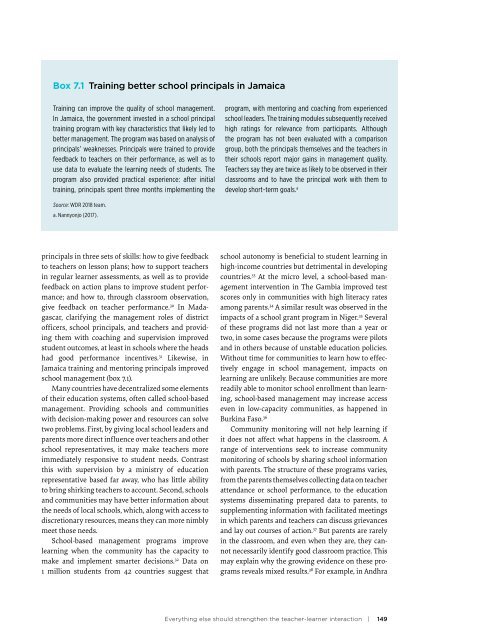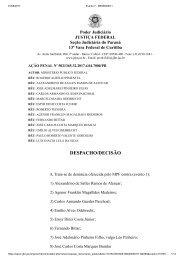Brasil só deve dominar Leitura em 260 anos, aponta estudo do Banco Mundial Relatorio Banco Mundial _Learning
You also want an ePaper? Increase the reach of your titles
YUMPU automatically turns print PDFs into web optimized ePapers that Google loves.
Box 7.1 Training better school principals in Jamaica<br />
Training can improve the quality of school manag<strong>em</strong>ent.<br />
In Jamaica, the government invested in a school principal<br />
training program with key characteristics that likely led to<br />
better manag<strong>em</strong>ent. The program was based on analysis of<br />
principals’ weaknesses. Principals were trained to provide<br />
feedback to teachers on their performance, as well as to<br />
use data to evaluate the learning needs of students. The<br />
program also provided practical experience: after initial<br />
training, principals spent three months impl<strong>em</strong>enting the<br />
program, with mentoring and coaching from experienced<br />
school leaders. The training modules subsequently received<br />
high ratings for relevance from participants. Although<br />
the program has not been evaluated with a comparison<br />
group, both the principals th<strong>em</strong>selves and the teachers in<br />
their schools report major gains in manag<strong>em</strong>ent quality.<br />
Teachers say they are twice as likely to be observed in their<br />
classrooms and to have the principal work with th<strong>em</strong> to<br />
<strong>deve</strong>lop short-term goals. a<br />
Source: WDR 2018 team.<br />
a. Nannyonjo (2017).<br />
principals in three sets of skills: how to give feedback<br />
to teachers on lesson plans; how to support teachers<br />
in regular learner assessments, as well as to provide<br />
feedback on action plans to improve student performance;<br />
and how to, through classroom observation,<br />
give feedback on teacher performance. 30 In Madagascar,<br />
clarifying the manag<strong>em</strong>ent roles of district<br />
officers, school principals, and teachers and providing<br />
th<strong>em</strong> with coaching and supervision improved<br />
student outcomes, at least in schools where the heads<br />
had good performance incentives. 31 Likewise, in<br />
Jamaica training and mentoring principals improved<br />
school manag<strong>em</strong>ent (box 7.1).<br />
Many countries have decentralized some el<strong>em</strong>ents<br />
of their education syst<strong>em</strong>s, often called school-based<br />
manag<strong>em</strong>ent. Providing schools and communities<br />
with decision-making power and resources can solve<br />
two probl<strong>em</strong>s. First, by giving local school leaders and<br />
parents more direct influence over teachers and other<br />
school representatives, it may make teachers more<br />
immediately responsive to student needs. Contrast<br />
this with supervision by a ministry of education<br />
representative based far away, who has little ability<br />
to bring shirking teachers to account. Second, schools<br />
and communities may have better information about<br />
the needs of local schools, which, along with access to<br />
discretionary resources, means they can more nimbly<br />
meet those needs.<br />
School-based manag<strong>em</strong>ent programs improve<br />
learning when the community has the capacity to<br />
make and impl<strong>em</strong>ent smarter decisions. 32 Data on<br />
1 million students from 42 countries suggest that<br />
school autonomy is beneficial to student learning in<br />
high-income countries but detrimental in <strong>deve</strong>loping<br />
countries. 33 At the micro level, a school-based manag<strong>em</strong>ent<br />
intervention in The Gambia improved test<br />
scores only in communities with high literacy rates<br />
among parents. 34 A similar result was observed in the<br />
impacts of a school grant program in Niger. 35 Several<br />
of these programs did not last more than a year or<br />
two, in some cases because the programs were pilots<br />
and in others because of unstable education policies.<br />
Without time for communities to learn how to effectively<br />
engage in school manag<strong>em</strong>ent, impacts on<br />
learning are unlikely. Because communities are more<br />
readily able to monitor school enrollment than learning,<br />
school-based manag<strong>em</strong>ent may increase access<br />
even in low-capacity communities, as happened in<br />
Burkina Faso. 36<br />
Community monitoring will not help learning if<br />
it <strong>do</strong>es not affect what happens in the classroom. A<br />
range of interventions seek to increase community<br />
monitoring of schools by sharing school information<br />
with parents. The structure of these programs varies,<br />
from the parents th<strong>em</strong>selves collecting data on teacher<br />
attendance or school performance, to the education<br />
syst<strong>em</strong>s diss<strong>em</strong>inating prepared data to parents, to<br />
suppl<strong>em</strong>enting information with facilitated meetings<br />
in which parents and teachers can discuss grievances<br />
and lay out courses of action. 37 But parents are rarely<br />
in the classroom, and even when they are, they cannot<br />
necessarily identify good classroom practice. This<br />
may explain why the growing evidence on these programs<br />
reveals mixed results. 38 For example, in Andhra<br />
Everything else should strengthen the teacher-learner interaction | 149








